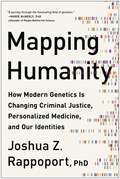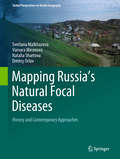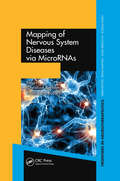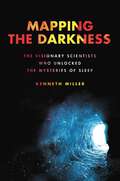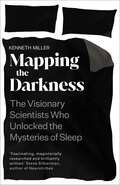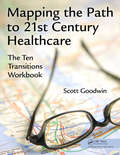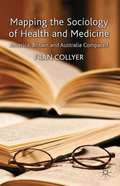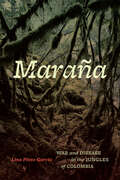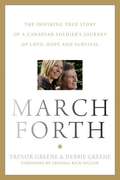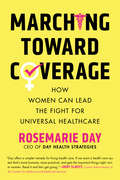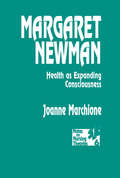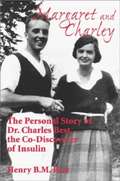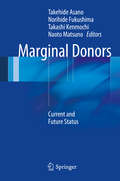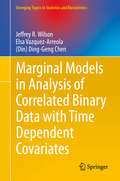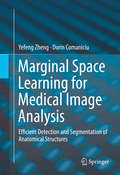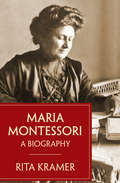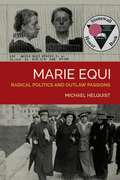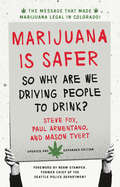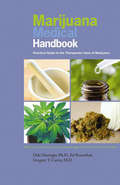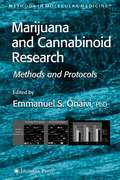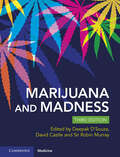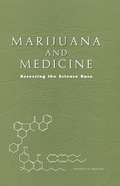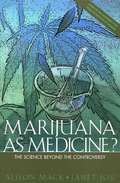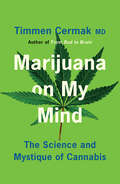- Table View
- List View
Mapping Humanity: How Modern Genetics Is Changing Criminal Justice, Personalized Medicine, and Our Identities
by Joshua Z. Rappoport"A good companion for those with a science background interested in learning more about human genetics." —Booklist Thanks to the popularity of personal genetic testing services, it's now easier than ever to get information about our own unique DNA—but who does this information really benefit? And, as genome editing and gene therapy transform the healthcare landscape, what do we gain—and what might we give up in return? Inside each of your cells is the nucleus, a small structure that contains all of the genetic information encoded by the DNA inside, your genome. Not long ago, the first human genome was sequenced at a cost of nearly $3 billion; now, this same test can be done for about $1,000. This new accessibility of genome sequence information creates huge potential for advances in how we understand and treat disease, among other things. It also raises significant concerns regarding ethics and personal privacy. In Mapping Humanity: How Modern Genetics Is Changing Criminal Justice, Personalized Medicine, and Our Identities, cellular biology expert Joshua Z. Rappoport provides a detailed look at how the explosion in genetic information as a result of cutting-edge technologies is changing our lives and our world. Inside, discover: An in-depth look at how your personal genome creates the unique individual that you are How doctors are using DNA sequencing to identify the underlying genetic causes of disease Why the field of gene therapy offers amazing potential for medical breakthroughs—and why it's taking so long The fantastic potential—and troubling concerns—surrounding genome editing The real impact—and validity—of popular personal genetic testing products, such as 23andMe Details of how molecular biology and DNA are changing the criminal justice system Facts you should know about Genetically Modified Organisms (GMOs) Throughout, in compelling, accessible prose, Rappoport explores the societal, ethical, and economic impacts of this new era. Offering a framework for balancing the potential risks and benefits of genetic information technologies and genetic engineering, Mapping Humanity is an indispensable guide to navigating the possibilities and perils of our gene-centric future.
Mapping Russia's Natural Focal Diseases: History And Contemporary Approaches (Global Perspectives on Health Geography)
by Dmitry Orlov Svetlana Malkhazova Varvara Mironova Natalia Shartova Vadim Rumyantsev Mikhail SoldatovThis book is the first scientific publication on diseases caused by agents circulating in natural environments independently from humans, covering the whole territory of the Russian Federation. It contains diverse and multifaceted information, both in textual and cartographic form.The book focuses on the historical and current distribution of natural-focal diseases in Russia, epidemiological aspects, natural and socio-economic determinants conducing natural foci. With a series of maps this book depicts population morbidity rates in particular regions and on a national level for the 21st century.With numerous color illustrations this book appeals to a wide audience and is of particular interest to geographers, environmental workers, epidemiologists and other specialists interested in environmental and public health issues.
Mapping of Nervous System Diseases via MicroRNAs (Frontiers In Neurotherapeutics Ser. #2)
by Christian Barbato Francesca RubertiIn recent years, understanding of microRNA (miRNA) biogenesis, the molecular mechanisms by which miRNAs regulate gene expression, and the functional roles of miRNAs has expanded. Mapping of Nervous System Diseases via MicroRNAs provides an up-to-date review on the function of miRNA in neurological diseases as well as advancements in technology for
Mapping the Darkness: The Visionary Scientists Who Unlocked the Mysteries of Sleep
by Kenneth MillerNAMED A BEST BOOK OF THE YEAR 2023 BY THE NEW YORKER NEW YORK TIMES EDITOR'S CHOICE SELECTION "A propulsive, utterly engrossing history... None of it is simple and all of it is captivating."—The New York Times "Mapping the Darkness offers two narratives at once: a sweeping journey of discovery about dreams, sleep and the terra incognita of unconsciousness; and a wake-up call about the dangers of chronic exhaustion. It&’s time, Mr. Miller tells us, to take our sleep back."—The Wall Street JournalFrom award-winning journalist Kenneth Miller comes the definitive story of the scientists who set out to answer two questions: &“Why do we sleep?&” and "How can we sleep better?&” A century ago, sleep was considered a state of nothingness—even a primitive habit that we could learn to overcome. Then, an immigrant scientist and his assistant spent a month in the depths of a Kentucky cave, making nationwide headlines and thrusting sleep science to the forefront of our consciousness. In the 1920s, Nathaniel Kleitman founded the world&’s first dedicated sleep lab at the University of Chicago, where he subjected research participants (including himself) to a dizzying array of tests and tortures. But the tipping point came in 1938, when his cave experiment awakened the general public to the unknown—and vital—world of sleep. Kleitman went on to mentor the talented but troubled Eugene Aserinsky, whose discovery of REM sleep revealed the astonishing activity of the dreaming brain, and William Dement, a jazz-bass playing revolutionary who became known as the father of sleep medicine. Dement, in turn, mentored the brilliant maverick Mary Carskadon, who uncovered an epidemic of sleep deprivation among teenagers, and launched a global movement to fight it. Award-winning journalist Kenneth Miller weaves together science and history to tell the story of four outsider scientists who took sleep science from fringe discipline to mainstream obsession through spectacular experiments, technological innovation, and single-minded commitment. Readers will walk away with a comprehensive understanding of sleep and why it affects so much of our lives.
Mapping the Darkness: The Visionary Scientists Who Unlocked the Mysteries of Sleep
by Kenneth Miller&‘Fascinating, magisterially researched, and brilliantly written.&’ Steve Silberman, author of Neurotribes Thirty-two days underground. No heat. No sunlight. 4 June 1938. Nathaniel Kleitman and his research student make their way down the seventy-one steps leading to the mouth of Mammoth Cave. They are about to embark on one of the most intrepid and bizarre experiments in medical history, one which will change our understanding of sleep forever. Undisturbed by natural light, they will investigate what happens when you overturn one of the fundamental rhythms of the human body. Together, they enter the darkness. When Kleitman first arrived in New York, a penniless twenty-year-old refugee, few would have guessed that in just a few decades he would revolutionise the field of sleep science. In Mapping the Darkness, Kenneth Miller weaves science and history to tell the story of the outsider scientists who took sleep science from the fringes to a mainstream obsession. Reliving the spectacular experiments, technological innovation, imaginative leaps and single-minded commitment of these early pioneers, Miller provides a tantalising glimpse into the most mysterious third of our lives.
Mapping the Path to 21st Century Healthcare: The Ten Transitions Workbook
by Scott GoodwinThe author‘s previous book, Transition to 21st Century Healthcare: A Guide for Leaders and Quality Professionals, provides a high-level view of American healthcare as transitioning through a period of industrialization, breaking down the fading structures of 20th century healthcare, and paving the way for 21st century healthcare.Mapping the Path to
Mapping the Sociology of Health and Medicine
by Fran CollyerThis book studies the sociology of health and medicine across three different countries, the USA, UK and Australia, examining the nature of disciplines and their specialties and posing sociological questions about the formation of intellectual fields and their social relations.
Maraña: War and Disease in the Jungles of Colombia
by Lina Pinto-GarcíaDelves into the relationship between war and disease, focusing on Colombian armed conflict and the skin disease known as cutaneous leishmaniasis. Cutaneous leishmaniasis, transmitted by female sandflies, produces skin lesions of varying size and shape. In Colombia, the insect vector of the disease is native to the same forested environments that have served as the main stage for one of the longest and most violent wars in Latin American history. As a result, the populations most affected by leishmaniasis in Colombia are members of the state army and nonstate armed groups. Lina Pinto-García explores how leishmaniasis and the armed conflict are inextricably connected and mutually reinforcing. Maraña means “tangle” in Spanish but is also commonly used in Colombia to name the entangled greenery, braided lianas, and dense foliage that characterize the tropical forests where leishmaniasis transmission typically occurs. Pinto-García argues that leishmaniasis and the war are not merely linked but enmarañadas to each other through narratives, technologies, and practices produced by the state, medicine, biomedical research, and the armed conflict itself. All told, Maraña is a passionate study of how war has shaped the production of scientific knowledge about leishmaniasis and access to its treatments in Colombia.
March Forth
by Trevor Greene Debbie GreeneAt the age of forty-one, Trevor Greene, a journalist and a reservist in the Canadian Forces, was deployed to Afghanistan, leaving behind his fiance, Debbie, and his young daughter, Grace. On March 4, 2006, while meeting with village elders in a remote village in Kandahar Province, Trevor removed his helmet, confident that a centuries-old pact would protect him from harm. Without warning, a teenage boy under the influence of the Taliban walked up to him and landed a rusty axe in his skull, nearly splitting his brain in two. Initially, Debbie was told that Trevor would not survive. When he did, she was told that he would never be able to communicate or move on his own. But after years of rehabilitation, setbacks and crises, Trevor not only learned how to talk and move again, but in July 2010, he stood up at his wedding, Debbie at his side and Grace carrying their rings down the aisle as their flower girl. March Forth is a remarkable story of love told in two voices: first in Trevor's, up until the attack; then in Debbie's, as she works tirelessly to rehabilitate her fiance. Together, Trevor and Debbie have written the next chapter in their remarkable story.
Marching Toward Coverage: How Women Can Lead the Fight for Universal Healthcare
by Rosemarie DayA lively, clear explanation of the American healthcare reform movement from a noted expert--giving women the tools they need to demand fair and affordable coverage for all peopleHealthcare is one of America's most dysfunctional and confusing industries, and women bear the brunt of the problem when it comes to both access and treatment. Women, who make 80 percent of healthcare decisions for their families, are disproportionately impacted by the complex nature of our healthcare system--but are also uniquely poised to fix it.Founder and CEO of Day Health Strategies Rosemarie Day wants women to recognize their trouble with accessing affordable care as part of a national emergency. Day encourages women throughout the country to share their stories and get involved, and she illustrates how a groundswell of activism, led by everyday women, could create the incentives our political leaders need to change course.Marching Toward Coverage gives women the clear information they need to move this agenda forward by breaking down complicated topics in an accessible manner, like the ACA (Affordable Care Act), preexisting conditions, and employer-sponsored plans. With more than 25 years working in healthcare strategy and related fields, Day helps the average American understand the business of national health reform and lays out a pragmatic path forward, one that recognizes healthcare as a fundamental human right.
Margaret Newman: Health as Expanding Consciousness
by Ms Joanne MarchioneMargaret Newman is one of the pre-eminent nursing theorists whose qualitative theories and methods have expanded the scientific base for the field. Her theory defines health as the unfolding or expanding of consciousness and nursing as an integrative force that focuses on the wholeness of the person. This volume offers a clear guide to applying theory to practice with individual, family and community health. Marchione's work reflects several years of experimentation and application of Newman's theory.
Margaret and Charley: The Personal Story of Dr. Charles Best, the Co-Discoverer of Insulin
by Henry B.M. BestAlthough Charles Best is known for discovering insulin, the story of his life neither begins nor ends with that one moment. Not only did he make many other discoveries, he was also one half of an extraordinary couple who, during their almost sixty years together, were involved in many of the significant events of the twentieth century. Margaret & Charley is the story of these two people from their beginnings on the east coast at the turn of the century through the years that followed. Through diaries, scrapbooks, photograph albums, and other documentation, the details of their lives are shared with the reader.
Marginal Donors
by Takehide Asano Norihide Fukushima Takashi Kenmochi Naoto MatsunoIn response to persistent donor organ shortages, organs from marginal donors, such as expanded criteria donors (ECD) and donation after cardiac death (DCD) donors, are now accepted and have been successfully transplanted, reducing the waiting times for transplantation. Especially in Japan, transplantation of DCD kidneys has a relatively long history because of the difficulty or lack of national consensus in accepting brain death, which has made it possible to accumulate considerable clinical experience. Thus, the current organ shortage has stimulated interest in the use of marginal donors for transplantation. On the other hand, however, it is known that these organs have a high rate of delayed graft function and a more complicated postoperative course. These drawbacks have created the greatest clinical challenge in transplantation to date because of the current shortage and limitations of donors using ECD and DCD. This book, prepared by distinguished authorities in their fields, is intended for clinicians and researchers. It highlights the use of marginal donors as a comparatively novel source of transplantation organs and provides a thorough overview of marginal donors from their historical origins to recent clinical applications, including the state-of-the-art science of organ/donor management, procurement, and preservation. Also provided is valuable information on ABO-incompatible donors which extend the availability of donor sources. Each chapter offers an individual analysis of the optimal requirements for the safe management and preservation of organs, including the heart, lung, liver, kidney, pancreas, and pancreatic islets.
Marginal Models in Analysis of Correlated Binary Data with Time Dependent Covariates (Emerging Topics in Statistics and Biostatistics)
by Jeffrey R. Wilson (Din) Ding-Geng Chen Elsa Vazquez-ArreolaThis monograph provides a concise point of research topics and reference for modeling correlated response data with time-dependent covariates, and longitudinal data for the analysis of population-averaged models, highlighting methods by a variety of pioneering scholars. While the models presented in the volume are applied to health and health-related data, they can be used to analyze any kind of data that contain covariates that change over time. The included data are analyzed with the use of both R and SAS, and the data and computing programs are provided to readers so that they can replicate and implement covered methods. It is an excellent resource for scholars of both computational and methodological statistics and biostatistics, particularly in the applied areas of health.
Marginal Space Learning for Medical Image Analysis
by Yefeng Zheng Dorin ComaniciuAutomatic detection and segmentation of anatomical structures in medical images are prerequisites to subsequent image measurements and disease quantification, and therefore have multiple clinical applications. This book presents an efficient object detection and segmentation framework, called Marginal Space Learning, which runs at a sub-second speed on a current desktop computer, faster than the state-of-the-art. Trained with a sufficient number of data sets, Marginal Space Learning is also robust under imaging artifacts, noise and anatomical variations. The book showcases 35 clinical applications of Marginal Space Learning and its extensions to detecting and segmenting various anatomical structures, such as the heart, liver, lymph nodes and prostate in major medical imaging modalities (CT, MRI, X-Ray and Ultrasound), demonstrating its efficiency and robustness.
Maria Montessori: A Biography
by Rita KramerThe definitive biography of a physician, feminist, social reformer, educator, and one of the most influential, and controversial women of the 20th century. Maria Montessori effected a worldwide revolution in the classroom. She developed a new method of educating the young and inspired a movement that carried it into every corner of the world. This is the story of the woman behind the public figure—her accomplishments, her ideas, and her passions. Montessori broke the mold imposed on women in the nineteenth century and forged a new one, first for herself and eventually for those who came after her. Against formidable odds she became the first woman to graduate from the medical school of the University of Rome and then devoted herself to the condition of children considered uneducable at the time. She developed a teaching method that enabled them to do as well as normal children, a method which then led her to found a new kind of school—the Casa dei Bambini, or House of Children—which gained her worldwide fame and still pervades classrooms wherever young children learn. This biography is not only the story of a groundbreaking feminist but a vital chapter in the history of education.&“Highly recommended for educators, parents, and moderate feminists who seek inspiration from one of the most accomplished women of this or any other age.&”—Publishers Weekly
Marie Equi: Radical Politics and Outlaw Passions
by Michael HelquistMarie Equi explores the fiercely independent life of an extraordinary woman. Born of Italian-Irish parents in 1872, Marie Equi endured childhood labor in a gritty Massachusetts textile mill before fleeing to an Oregon homestead with her first longtime woman companion, who described her as impulsive, earnest, and kind-hearted. These traits, along with courage, stubborn resolve, and a passion for justice, propelled Equi through an unparalleled life journey. Equi self-studied her way into a San Francisco medical school and then obtained her license in Portland to become one of the first practicing woman physicians in the Pacific Northwest. From Pendleton, Portland, Seattle and beyond to Boston and San Francisco, she leveraged her professional status to fight for woman suffrage, labor rights, and reproductive freedom. She mounted soapboxes, fought with police, and spent a night in jail with birth control advocate Margaret Sanger. Equi marched so often with unemployed men that the media referred to them as her army. She battled for economic justice at every turn and protested the U. S. entry into World War I, leading to a conviction for sedition and a three-year sentence in San Quentin. Breaking boundaries in all facets of life, she became the first well-known lesbian in Oregon, and her same-sex affairs figured prominently in two U. S. Supreme Court cases. Marie Equi is a finely written, rigorously researched account of a woman of consequence, who one fellow-activist considered "the most interesting woman that ever lived in this state, certainly the most fascinating, colorful, and flamboyant. " This much anticipated biography will engage anyone interested in Pacific Northwest history, women's studies, the history of lesbian and gay rights, and the personal demands of political activism. It is the inspiring story of a singular woman who was not afraid to take risks, who refused to compromise her principles in the face of enormous opposition and adversity, and who paid a steep personal price for living by her convictions.
Marijuana Is Safer
by Steve Fox Paul Armentano Mason TvertNationally recognized marijuana-policy experts Steve Fox, Paul Armentano, and Mason Tvert compare and contrast the relative harms and legal status of the two most popular recreational substances in the world--marijuana and alcohol. Through an objective examination of the two drugs and the laws and social practices that steer people toward alcohol, the authors pose a simple yet rarely considered question: Why do we punish adults who make the rational, safer choice to use marijuana instead of alcohol?Marijuana Is Saferreaches for a broad audience. For those unfamiliar with marijuana, it provides an introduction to the cannabis plant and its effects on the user, and debunks some of the government's most frequently cited marijuana myths. For current and aspiring advocates of marijuana-law reform, as well as anyone else who is interested in what is becoming a major political battle, the authors spell out why the message that marijuana is safer than alcohol must be a prominent part of the public debate over legalization. Most importantly, for the millions of Americans who want to advance the cause of marijuana-policy reform--or simply want to defend their own personal, safer choice--this book provides the talking points and detailed information needed to make persuasive arguments to friends, family, coworkers, and elected officials.
Marijuana Medical Handbook
by Ed Rosenthal Gregory T. Carter Dale GieringerAn estimated 40 million Americans have medical symptoms that marijuana can relieve. Marijuana Medical Handbook is a one-stop resource that gives candid, objective advice on using marijuana for healing, understanding its effects on the body, safe administration, targeting illnesses, side effects, and the various delivery methods from edibles and tinctures to smokeless vaporizer pipes. The book also details supply issues, cultivation solutions (in a chapter by renowned expert Ed Rosenthal), and legal consequences. This thoroughly revised edition incorporates the most up-to-date information on the ever-changing politics of marijuana, the plant's usage, and medical research on it.
Marijuana Medical Handbook: Practical Guide to Therapeutic Uses of Marijuana
by Ed Rosenthal Gregory T. Carter Dale GieringerAn estimated 40 million Americans have medical symptoms that marijuana can relieve. Marijuana Medical Handbook is a one-stop resource that gives candid, objective advice on using marijuana for healing, understanding its effects on the body, safe administration, targeting illnesses, side effects, and the various delivery methods from edibles and tinctures to smokeless vaporizer pipes. The book also details supply issues, cultivation solutions (in a chapter by renowned expert Ed Rosenthal), and legal consequences. This thoroughly revised edition incorporates the most up-to-date information on the ever-changing politics of marijuana, the plant's usage, and medical research on it.
Marijuana and Cannabinoid Research
by Emmanuel S. OnaiviA cutting-edge collection of readily reproducible in vitro and in vivo methods to elucidate the mechanisms associated with cannabinoid function in health and disease. The techniques can be used in studies across the board from genes to behavior. The molecular neurobiological methods are invaluable in analyzing the structure, the polymorphisms, and the molecular expression of the cannabinoid receptors (CBrs), as well as their association with polysubstance abuse. There are also methods for localizing cannabinoid receptors in different systems, visualizing cannabinoid effects using brain slice imaging and elctrophysiological approaches, and designing and synthesizing cannabinoids and endocannabinoids. The protocols follow the successful Methods in Molecular MedicineTM series format, each offering step-by-step laboratory instructions, an introduction outlining the principles behind the technique, lists of the necessary equipment and reagents, and tips on troubleshooting and avoiding known pitfalls.
Marijuana and Madness
by David J. Castle Deepak Cyril D’Souza Murray, Sir Robin M.An updated third edition of this award-winning book provides a comprehensive overview of the complex associations between cannabis and mental illness. Organised into easy to navigate sections, the book has been fully revised to feature eight entirely new chapters covering important novel aspects. Marijuana and Madness incorporates new research findings on the potential use of cannabinoids, and synthetic cannabinoids, in an array of mental illnesses, balanced against the potential adverse effects. The associations between cannabis and psychosis, developing putative models of 'cannabis induced' psychosis and pathways to schizophrenia are all covered. The book importantly discusses the impact of exposure to cannabis at various stages of neurodevelopment (in utero, in childhood, and during adolescence) and it thoroughly reviews the treatments for cannabis dependence and health policy implications of the availability of increasingly high potency cannabis. This book will quickly become an essential resource for all members of the mental health team.
Marijuana and Medicine: Assessing the Science Base
by Institute of MedicineThe medical use of marijuana is surrounded by a cloud of social, political, and religious controversy, which obscures the facts that should be considered in the debate.This book summarizes what we know about marijuana from evidence-based medicine--the harm it may do and the relief it may bring to patients. The book helps the reader understand not only what science has to say about medical marijuana but also the logic behind the scientific conclusions.Marijuana and Medicine addresses the science base and the therapeutic effects of marijuana use for medical conditions such as glaucoma and multiple sclerosis. It covers marijuana's mechanism of action, acute and chronic effects on health and behavior, potential adverse effects, efficacy of different delivery systems, analysis of the data about marijuana as a gateway drug, and the prospects for developing cannabinoid drugs. The book evaluates how well marijuana meets accepted standards for medicine and considers the conclusions of other blue-ribbon panels.Full of useful facts, this volume will be important to anyone interested in informed debate about the medical use of marijuana: advocates and opponents as well as policymakers, regulators, and health care providers.
Marijuana as Medicine? The Science Beyond the Controversy
by Alison MackSome people suffer from chronic, debilitating disorders for which no conventional treatment brings relief. Can marijuana ease their symptoms? Would it be breaking the law to turn to marijuana as a medication? There are few sources of objective, scientifically sound advice for people in this situation. Most books about marijuana and medicine attempt to promote the views of advocates or opponents. To fill the gap between these extremes, authors Alison Mack and Janet Joy have extracted critical findings from a recent Institute of Medicine study on this important issue, interpreting them for a general audience. Marijuana As Medicine? provides patients--as well as the people who care for them--with a foundation for making decisions about their own health care. This empowering volume examines several key points, including: Whether marijuana can relieve a variety of symptoms, including pain, muscle spasticity, nausea, and appetite loss. The dangers of smoking marijuana, as well as the effects of its active chemical components on the immune system and on psychological health. The potential use of marijuana-based medications on symptoms of AIDS, cancer, multiple sclerosis, and several other specific disorders, in comparison with existing treatments. Marijuana As Medicine? introduces readers to the active compounds in marijuana. These include the principal ingredient in Marinol, a legal medication. The authors also discuss the prospects for developing other drugs derived from marijuana's active ingredients. In addition to providing an up-to-date review of the science behind the medical marijuana debate, Mack and Joy also answer common questions about the legal status of marijuana, explaining the conflict between state and federal law regarding its medical use. Intended primarily as an aid to patients and caregivers, this book objectively presents critical information so that it can be used to make responsible health care decisions. Marijuana As Medicine? will also be a valuable resource for policymakers, health care providers, patient counselors, medical faculty and students--in short, anyone who wants to learn more about this important issue.
Marijuana on My Mind: The Science and Mystique of Cannabis
by Timmen CermakMarijuana is on everyone's mind. Why do so many people enjoy it? What is it doing in our brains? Is it safe for everyone to use? What should we be telling our children? What are the benefits of medical marijuana? How does CBD live up to its hype? Does marijuana have spiritual power? And with so much conflicting information out there, how do we begin to make up our own minds about cannabis? Marijuana on My Mind is for anyone who has ever experienced the mystique of cannabis or wondered exactly how cannabis works. With over 40 years of clinical experience, Dr Timmen Cermak uses science to make sense of the endless debate between advocates and opponents of cannabis and provides answers to some of the greatest mysteries surrounding marijuana.
